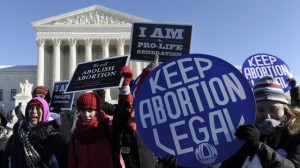This post originally appeared at The Nation.

Pro-abortion and anti-abortion protestors rally outside the Supreme Court in Washington, Jan. 22, 2014. (AP Photo/Susan Walsh)
For years the pro-choice movement has had to battle a wide array of restrictions passed on the state level, from onerous regulations on abortion clinics to “fetal pain” bills that deliberately give women bad information about abortion procedures. In fact, from 2011 through 2013, more than 200 state laws were passed that make it harder for women to access abortion services.
But the Senate Judiciary Committee held an important hearing Tuesday on a bill that could, in one swoop, clear out most of those laws. The Women’s Health Protection Act, introduced last year by Senators Richard Blumenthal and Tammy Baldwin, enumerates many of these laws that would be expressly prohibited and keeps abortion providers from being singled out by legislation that doesn’t apply broadly to most other medical services in the state.
Republican senators and witnesses at the hearing, as one would expect, objected strenuously to the legislation. They relentlessly brought up the case of Dr. Kermit Gosnell, a Philadelphia-area abortion doctor who repeatedly broke the law and carried out gruesome, illegal abortions. Their message was that these state laws just aim to make abortion safer and avoid more cases like Gosnell’s.
In reality, Gosnell was already operating well outside the bounds of the law and is actually a better example of what would happen were abortion to be outlawed entirely. As Nancy Northrup, president of the Center for Reproductive Rights, testified at the hearing, that is the real and often stated goal of these laws:
[O]pponents of women’s reproductive rights, seeking to make an end run around public opinion and the Constitution itself, have shifted their strategy. They have resorted to obfuscating their true agenda by pushing laws that pretend to be about one thing but are actually about another. They claim these laws are about defending women’s health and well-being, and improving the safety of abortion care—but they most assuredly are not. They are wolves in sheep’s clothing. They are advanced by politicians, not by doctors, often based on model legislation written by explicitly anti-abortion groups.
When Mississippi enacted such a law in 2012, a state senator put it quite plainly: “There’s only one abortion clinic in Mississippi. I hope this measure shuts that down.” Others showed their hands as well. Lt. Governor Tate Reeves stated that the measure “should effectively close the only abortion clinic in Mississippi” and “end abortion in Mississippi” when the bill passed the state Senate. Governor Phil Bryant, in vowing to sign the bill, said that he would “continue to work to make Mississippi abortion-free.” When he actually signed it, he said, “If it closes that clinic, then so be it.” Right now, Mississippi’s sole clinic is holding on by virtue of a temporary court order.
The legislation has essentially no chance of passing this Congress, but for pro-choice advocates, it presents a chance to at least go on the offensive. It also may be needed in coming months as a backstop to a potential Supreme Court decision that could severely restrict abortion access.
Many federal courts have blocked this sort of state legislation as de facto abortion bans, as Northrup noted. But legal experts are increasingly convinced the Court may take up one of these cases in the next term — and that five conservative justices could move to affirm these abortion-restricting laws and effectively hollow out Roe v. Wade. The Women’s Health Protection Act would be a simple way to neutralize that decision, should it come.


